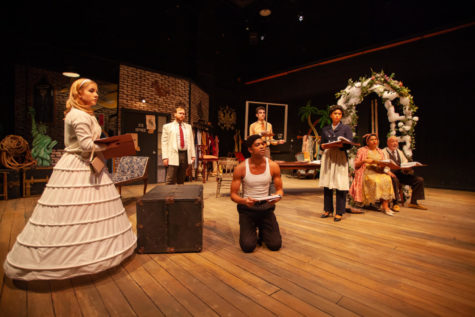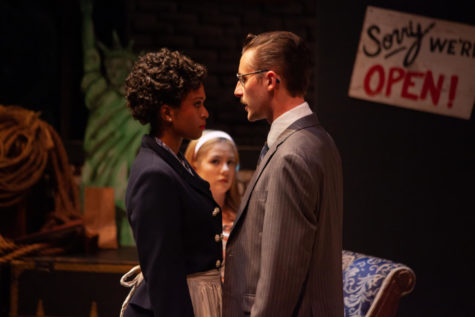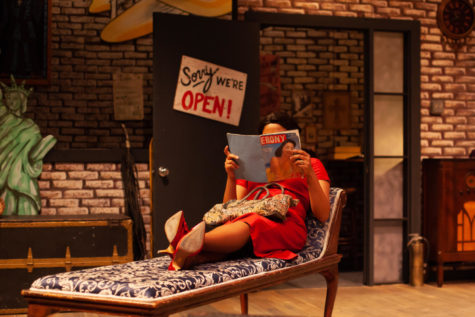‘Trouble in Mind’ juggles truth, equality on Tulane stage
November 17, 2021

In a seven-show run last week, the department of theatre and dance brought Alice Childress’ “Trouble in Mind” to the Tulane University stage.
A play within a play, “Trouble in Mind” explores the Black experience during the civil rights era while juggling ideas of truth and equality. Given the 64-year delay between the announcement of its debut on Broadway and its actual Broadway debut — previews began on Oct. 29 — Childress’ work remains just as relevant today as it was in 1955.
“I see ‘Trouble in Mind’ in relationship to the Montgomery Bus Boycott, in relationship to Ruby Bridges, in relationship to Emmett Till,” Director John “Ray” Proctor said. “Well, those events haven’t stopped. Events like that haven’t stopped … That’s why this play feels so contemporary.”
Act I sets the scene for the more turbulent Act II. The audience meets the characters and gets a taste of their rapport and relationships with one another. Wiletta Mayer is an experienced Black actress, who is excited to finally have a significant role on stage. She feels she has mastered being a Black woman in the theater industry and offers advice to her young colleague, John Nevins. Wiletta’s advice is termed “Uncle Tomming,” where she panders to the desires of white directors and producers, in order to further her career and accomplish her dreams.

As Act I progresses, it’s clear that Wiletta’s own advice is about to fail her. Aiyana Thomas excellently portrays a woman close to breaking, after seeming so stiffly positive at the start. Director Al Manners’ eccentricities and ignorance pushes Wiletta to a breaking point, which rears its head shortly after intermission.
In Act II, the focus quickly becomes the interactions of Wiletta and Al, who Jared Goudsmit electrically portrays as increasingly infuriating. Thomas and Goudsmit are both newly dressed in darker colors and suits, reflective of their impending blowout.
The cast and audience simultaneously discover that the anti-lynching play is only conditionally anti-lynching — Al discouraged the cast from reading the script ahead of time. While the rest of the actors are desperately trying to make peace with this revelation and ignore their own cognitive dissonance, Wiletta finally stands her ground, while appropriately wearing her power suit.
“Trouble in Mind” suddenly shifts from a subtle struggle with truth to an obvious, tumultuous one, with Al exclaiming that American people aren’t ready to see Black people the way they want to be seen. And while Childress wrote “Trouble in Mind” some 60 years ago, the resurgence of the Black Lives Matter movement in 2020 shows us that it and its messages are still extraordinarily relevant today.
As for the actual production, “Trouble in Mind” is staged in Tulane’s Alpert Lupin Memorial Theater. Originally, the play was set to be performed at the Southern Rep Theatre in the Tremé neighborhood of New Orleans. The production, however, was moved to Tulane’s campus following the surge in COVID-19 cases from the delta variant.

“We did not want attendance at this production to become a super spreader event. We did not want to risk the Black community in New Orleans to further higher risk of COVID,” Proctor said.
Given Tulane’s 97% campus vaccination rate, an on-campus production was deemed safest. Despite the change in plans, the Lupin brought “Trouble in Mind” to life as it immersed the audience in the production.
Actors come within inches of the first row, and the audience’s reactions — plus an occasional giggle from Proctor hidden in the back shadows — adds to the ambience of the comedy-drama. Audience chuckles enhance the high moments, while shocked gasps intensify the darker ones.
The cast is almost entirely Tulane students, and a lot of research went into preparing them for their roles. “This play is not just learning lines. It’s learning. It’s research … How did people move? How did they wear their hats? How did they hold their hands?” Proctor said.
The amount of attention that went into “Trouble in Mind” is evident. Upon entering the Lupin and viewing the set, it’s obvious that immense care and intentionality went into the production. Proctor and the cast were able to masterfully bring justice to Childress’ work.
“Trouble in Mind” is beautifully nostalgic and jarringly pertinent. According to Proctor, “This play is about survival and existence. What do we have to do to survive? What are we willing to do to exist?”
The department’s next production, “Eclipsed,” opens Dec. 10 in the Lupin Theater.






















Anonymous • Nov 29, 2021 at 1:42 pm
Thank you for covering this show. Would love to see more play reviews in the Hullabaloo!